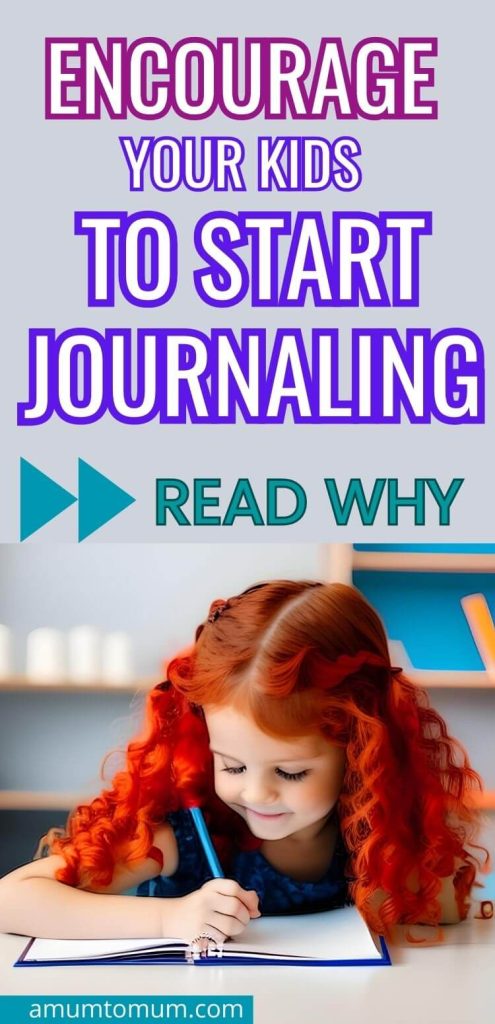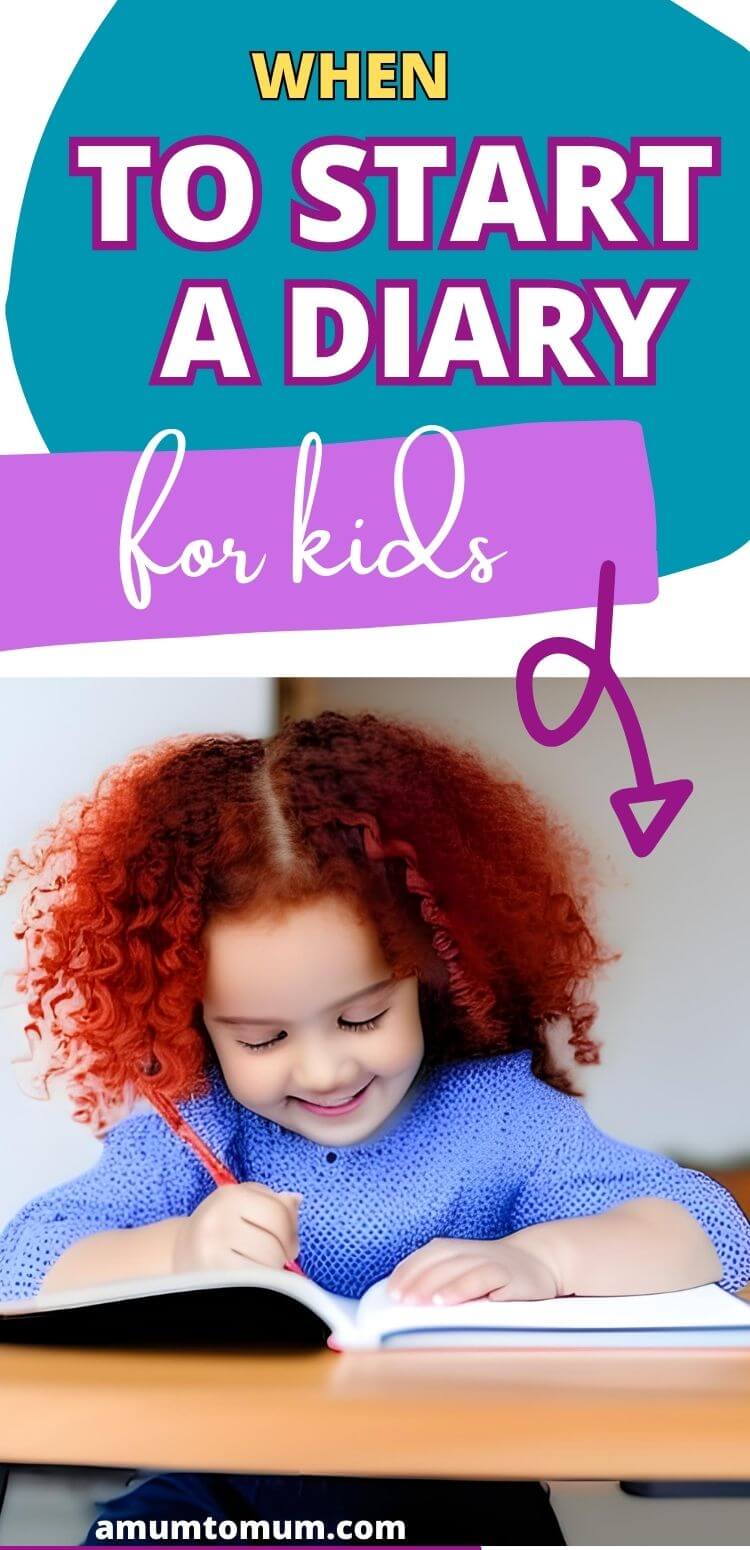Are you wondering what age should kids start journaling? I can vividly remember those days when I started to write a journal. I was 10 years old. It was so precious to me. The quiet moments with my thoughts, the possibility to vent my emotions and to deal with my struggles. I loved everything about it!
I would love to pass this passion on to you and your kids. They will thank you for it someday.
In my experience, there isn’t a definitive age that fits all children. It depends on your child’s developmental stage and interest. Some kids might be ready to start journaling as early as age 7 or 8, while others might find it more engaging around 9 or 10.

It’s essential to observe your child’s curiosity and enthusiasm to gauge when they might be ready to pick up a pen and begin expressing their thoughts.
When I introduced journaling to my daughter she was 7 years old. I made sure to make it a fun and personalized experience.
Allowing them to choose the journal and to make the process their own will help foster creativity and make journaling an enjoyable habit.
Trust me, fellow parents—you’ll be amazed by the benefits journaling can bring to your kids and how it can become a cherished part of their lives.
RELATED ARTICLE: How to teach your kids to Share
Benefits of Journaling for Kids
Emotional Expression
My kids have found that journaling is a great way to express their emotions. It helps them to better understand and process their feelings by putting them down on paper.
This can be especially beneficial during those confusing and emotional moments that every child goes through. Journaling allows them to work through their emotions and find clarity, making it a valuable coping tool.
Cognitive Development
I believe that journaling can contribute significantly to cognitive development in children.
- When writing a diary, kids engage in critical thinking, and problem-solving, and, ultimately, develop a better understanding of the world around them.
It’s amazing to see how their thoughts and ideas grow more coherent and sophisticated as they practice writing and reflecting in their diaries.
Boosting Creativity
It can be a great source of creativity for kids. My children enjoy brainstorming ideas for stories, drawing pictures, and exploring new topics in their journals.
It’s delightful as a parent to be able to foster their creative skills and watch how their imagination takes flight.
I can still see my daughter drawing comic stories into her diary pages.
Enhancing Writing Skills
- The more my kid writes in her journals, the more I can see her writing skills improve.
- They learn how to organize their thoughts, use proper grammar and spelling, and expand their vocabulary.
- It’s also an excellent opportunity for them to practice different writing styles and formats, which can help them excel in their academic and professional lives later on.
Boosts Immune System
According to the research published in the Advances in Psychiatric Treatment journal, expressive writing, especially on traumatic or emotional events can provide emotional and physical health benefits.
The study found that individuals who engaged in expressive writing experienced a reduction in symptoms of anxiety, depression, and post-traumatic stress disorder.
- Additionally, expressive writing was found to improve immune system functioning and reduce the severity of physical symptoms in individuals with chronic illnesses. Writing a journal can be a useful tool for improving both emotional and physical well-being.

I find it fulfilling to see the positive impact it has on my kids, and I hope other parents can also help their children take advantage of this wonderful activity.
Determining the Right Age to Start Journaling
As a mom who loves writing, as you can see, I wanted to share my thoughts on finding the right age for kids to start this wonderful habit. There’s no one-size-fits-all answer, but we can explore readiness indicators and individual factors to help find the perfect starting point for your little ones.
Readiness Indicators
- Fine motor skills: Young children should be able to hold a pen, crayon, or paintbrush comfortably. Their grasp of writing tools will directly impact their journaling experience. You can even let them get started with their hand, finger, or footprints if they are very young.
- Interest in writing or drawing: It’s important to notice if your child shows interest in expressing themselves through writing or drawing in their free time. This might suggest a natural inclination to journaling.
- Emotional awareness: The ability of your child to identify and express their emotions is a key factor in journaling. This can be especially helpful during the tween years of 9-12, as they navigate various developmental stages.

Considering Individual Factors
- Personality: Every child is unique, and writing down their thoughts needs to be tailored to their interests, needs, and preferences. Your child might enjoy creating lists, writing about their day, or drawing picture books. Pay attention to their hobbies and the way they communicate, and suggest journal writing themes accordingly.
- Emotional development: It can support your child’s emotional well-being and understanding of their own feelings. It’s important to consider where they are in their emotional development, as it could significantly influence the topics and style of journaling that resonates with them.
- Your own experiences: If you’re a journaling enthusiast like me, share your experience and the benefits you’ve gained from this practice with your kids. It might encourage them to give it a try too. Show them your diary when you were a kid!

**Disclosure: This page contains affiliate links. If you choose to purchase after clicking a link, I may receive a commission at no extra cost to you.
Choosing an Age-Appropriate Journaling Method
#1 Traditional Notebook
I introduced my younger kids to journaling using a traditional notebook. I found that this method works well for preschool-aged children, who need a simple and accessible way to express themselves.
It’s essential to choose the one with easy-to-turn pages and room for coloring or doodling. You might also want to provide your child with stickers, stamps, or other creative tools to personalize their journal.
In my experience, a spiral-bound notebook works best for this age group as it allows them to easily flip through the pages.
When old enough, you can encourage them to personalize their notebooks by drawing, using colorful pens, or decorating them with stickers. My older kid loves making her journals unique – it helps her take ownership of her writing practice and ensures she keeps writing regularly.
#2 Online and Digital Options
As kids grow older and become more tech-savvy, introduce them to online and digital diary options. Apps or websites designed for journaling can offer built-in prompts, organization features, and even privacy settings that can help older kids develop the habit safely and engagingly.
This method is ideal for teenagers who might prefer typing over writing by hand.
Keep in mind that it’s essential to monitor your child’s online presence for safety reasons or to avoid too much screen time. You can also have a conversation about privacy and the importance of not sharing personal information on the Internet.

#3 Printable Journals for Kids
- Printable diary pages can be a great tool for kids who want to start journaling. One advantage is that they offer a structured format that can make it easier for kids to get started.
- With pre-made prompts or a fill-in journal with spaces for writing, kids don’t have to worry about coming up with ideas or formatting their entries. Another advantage is that printable journal pages can be customized to suit a child’s interests or needs.
- For example, a child who loves animals might enjoy animal-themed prompts, while a child who struggles with anxiety might benefit from prompts focused on mindfulness and relaxation.
- Finally, printable diary pages can be easily printed and assembled into a physical book, which can make it feel more tangible and rewarding for kids.
I created an amazing printable diary for girls that you can print out and use over and over!
Helping Your Child Get Started
Setting Goals and Expectations
- First, it’s important to set realistic goals and expectations for your kids’ journal writing journey.
- Start by discussing the purpose of it – it can be a fun way to express themselves, get creative, document their thoughts, or work through emotions.
- Make sure they understand that it’s not about perfect spelling, writing, or grammar, but rather about exploring their feelings, and ideas and developing emotional intelligence.
Encourage your child to commit to a regular journaling schedule, but don’t make it feel like a chore. For example, they could write in their journal twice a week or every day after school. This will help them develop good habits and consistency in their writing.
I remember I used to do it in the evening. It was a way to blow off steam and all my emotions. I didn’t realize how beneficial it was at the time.

Providing Support and Encouragement
As with any new skill, provide support and encouragement to help them feel confident and enjoy this activity. Start by helping them choose a type of journal that they love, whether it’s a simple notebook or a beautifully decorated journal.
You may also provide them with fun writing tools, like colorful pens or pencils, and stickers.
Show genuine interest in their creative writing journey by asking about what they’ve written or encouraging them to share their entries with you if they feel comfortable.
Kids Journal Prompts
Journal prompts for kids can be a fun and creative way to get them started on this journey.
For instance, I’ve asked my children to write about their favorite memory from the day or to describe a new activity they’d like to try. Writing about their emotions, sleep, and dreams can also be a therapeutic way to process their thoughts and feelings.
To keep things fresh and engaging, I like using themed prompts or incorporating their favorite hobbies and characters into the journal entries.
For example, ask them to create a story with their favorite superhero or imagine a day in the life of their favorite animal. These fun prompts capture their interest and make journaling more enjoyable.
Here are 20 fun journal prompts for kids:
1. What is your favorite thing to do with your family?
2. Write about a time when you felt proud of yourself.
3. If you could have any superpower, what would it be and why?
4. Describe your dream vacation.
5. Write a letter to your future self.
6. What is your favorite book and why?
7. Write about a time when you had to be brave.
8. If you could have any animal as a pet, what would it be and why?
9. What does kindness mean to you?
10. Describe your favorite place in the world.
11. Write about a time when you learned something new.
12. If you could travel back in time, where and when would you go?
13. What is your favorite memory with a friend?
14. Write about a time when you helped someone.
15. If you could invent something, what would it be and why?
16. What is your favorite thing to do outside?
17. Write about a time when you made a mistake and what you learned from it.
18. If you could have any job in the world, what would it be and why?
19. What is something you’re good at and how did you become good at it?
20. Write about a time when you felt grateful.
After I got pregnant I started to journal again. I wrote about my pregnancy, and their funny sayings, what they ate and did at what age. I do believe they will treasure it someday.
Remember, the key is to introduce it in an enjoyable way so that your kids will love and benefit from it. Happy journaling!
Want to save this article for later?
Pin it!





